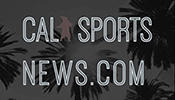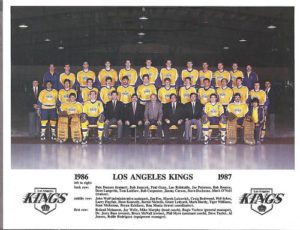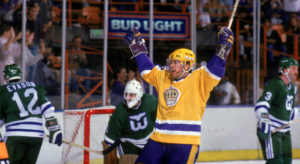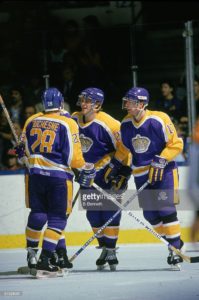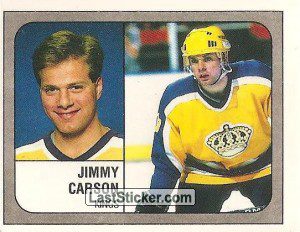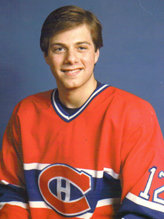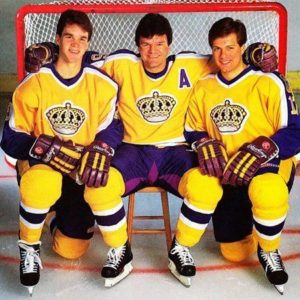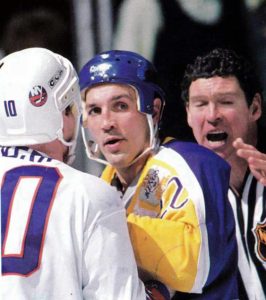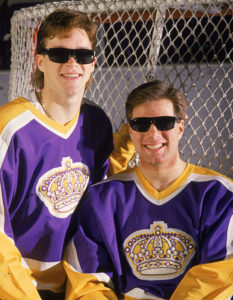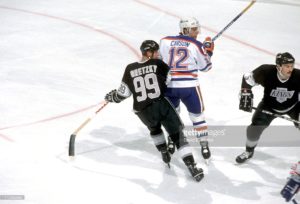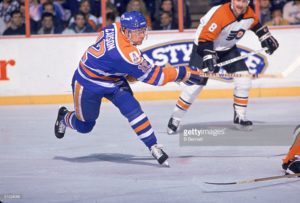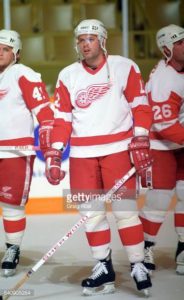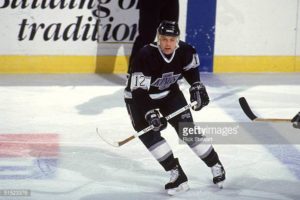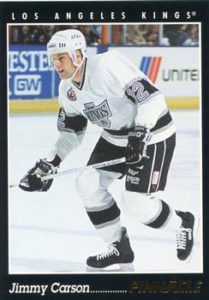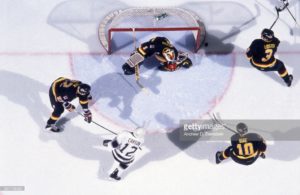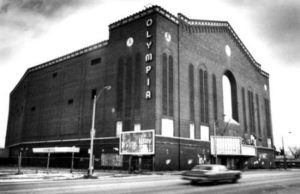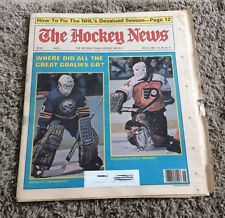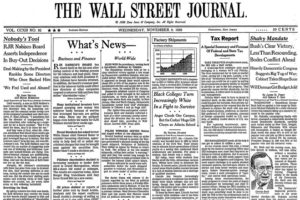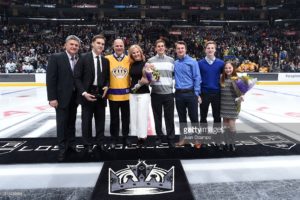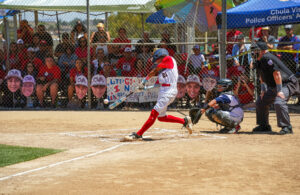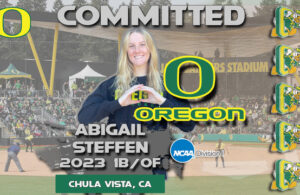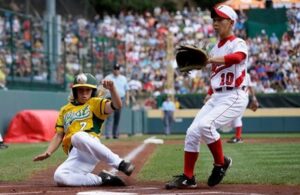Interview With Former LA King Jimmy Carson
- Updated: November 4, 2017

It is no secret to anyone who has regularly read my work here for CaliSports News to know that I became a Los Angeles Kings’ fan back in the spring of 1987 after watching the first round of the Stanley Cup playoffs between the Kings and the Edmonton Oilers. What appealed to this Northeastern Canadian boy about the Kings, who lived approximately 2,500 miles away from Los Angeles, (and besides the playoffs had NO television coverage of his new favorite team unless the Kings were playing the Toronto Maple Leafs or Montreal Canadiens), were four young and talented players that caught his imagination. Nicknaming them forever as his “LA Kings’ Four Horsemen”, (and yes it was loosely based off of pro wrestling’s “Four Horsemen” of Ric Flair, Tully Blanchard, Arn Anderson and at that time Lex Luger, and by loosely I mean A LOT! Hey I was kid, what do you want?), as an adult it has been an honor and a dream come true to have the fortunate opportunities to have gotten to either meet in person, or talk to on the phone, these same “LA Kings’ Four Horsemen” that inspired me to enter the Kingdom and permanently stay forever, (despite the foul cries of my family, friends, schoolmates, teachers, barber down the street and old lady that always tried to walk her cat (don’t ask), who cheered more local franchises and wanted me to join them). Those four young players were rookies Jimmy Carson, Luc Robitaille and Steve Duchesne, along with six-year veteran, but still only 26 years old, Bernie Nicholls, and just like when they were playing with the Kings, meeting them did not disappoint.
James Carson, born on July 20, 1968, in Southfield, MI, he was the first of my cherished “Horsemen” to be traded away, but the last of the “Four” that I was honored to talk to. As a player, after scoring 37 goals and 79 points in his rookie year, and then upping his game by achieving 55 goals and 107 points in his second, with a strong skating ability, sharp scoring instincts and a gift for playmaking as if he was hockey’s version of a quarterback, Jimmy Carson left a positive impression on me. So much so, that I continued to be a fan and follow his playing career (and collect his hockey cards) even after he was traded away from LA to the enemy Oilers in a blockbuster sale, I mean trade for “The Great One” Wayne Gretzky.
Now do not get me wrong. I was extremely excited that Gretzky was coming to my team! Especially when I was born in Cambridge, ON and the house I grew up in was literally a 15 minute drive to Gretzky’s childhood home, door to door in Brantford, ON, I was pumped and thanked the hockey Gods for delivering me to the Kings and as it was now obviously fate, but yet at the same time, it was also bittersweet as I felt like I was gut punched when it was announced that Jimmy Carson was the one to go the other way. After only a year and a half, my “Four Horsemen” were no more, and never to be fully reunited as Kings’ teammates again.
So I followed Carson and his career in Edmonton, (which was easy considering they played in the same Smythe Division as the Kings did), and then to Detroit where he played for a few years before he came back to LA, reuniting with fellow “Horseman” Luc Robitaille and now playing on the same side as Gretzky, that led to an epic playoff run for the Kings in 1993. I continued to keep an eye on him after he left LA a final time and played for the Vancouver Canucks and the Hartford Whalers (now Carolina Hurricanes) and to the good ‘ole International Hockey League with the Detroit Vipers.
After that, I lost touch with him as a fan after he retired from his playing career, but always stayed alert and enjoyed any news or stories whenever he popped back up in the hockey scene. I was proud and cheered when the Kings’ organization brought Carson back to be celebrated with his own “Legend’s night” in 2016 and tried to play it cool and calm when I was granted this interview with him, but like with the other three “Horsemen”, my cool and calmness quickly disappeared, replaced by my more traditional LA Kings’ “fanboy-ism” mannerisms. And like the classy gentleman that he is, Carson wasn’t bothered by it at all by it and was happy to talk to me and talk about his playing career, especially with the Los Angeles Kings.
So, ladies and gentlemen, I present to you, my interview with one of my childhood heroes, former LA King, Jimmy Carson!
Growing up as a child, what was it about the sport of hockey that appealed to you? Did you have any hockey idols?
Good questions. The last part of that question is easy. Guy LaFleur of the Montreal Canadiens. Actually, it was Marcel Dionne first because he played in Detroit when I was little, and then he got traded away. Guy Lafleur very quickly became my idol of idols. What attracted me to the game? I liked skating. I was pretty good at it. When you’re 4 years old you don’t think much about what attracts me or not. You were skating and you just knew you liked doing it.
You had an incredible two-year junior career with the Verdun Junior Canadiens in the Quebec Major Junior Hockey League. In your first season in 1985, you achieved 116 points in 68 games, plus another 26 points in the playoffs, going on to win the QMJHL President’s Cup and compete in the Memorial Cup Final. The next year, you achieved 70 goals and 153 points in 69 games! Could you tell us about your experience playing in Quebec as a junior?
I loved playing in Quebec. I actually lived with a French Canadian family and I learned how to speak French. It was just a great cultural experience. I loved the Montreal Canadiens and like I mentioned, Guy LaFleur was my idol so to me it was awesome, and I loved it. It was just a great two years there and I played with some wonderful players who had good careers in the NHL and I look back very fondly on those two years in the Quebec Major Junior Hockey League in Verdun.
After an incredible junior career, you were drafted second overall by the Los Angeles Kings in the 1986 NHL entry draft. What were your initial thoughts and feelings about being selected by the Kings?
I had mixed feelings because coming from junior hockey in Montreal where hockey was everything, I was told that hockey wasn’t much in LA. But it was still the NHL and I was still the 2nd overall pick, so I said I was going to go with an open mind and let’s see how it goes and turns out. And it played out very well.
You mentioned that Marcel Dionne was one of your idols. He was, of course, playing with the Kings at that time and you got to play with him during your rookie season in 1986-87 before he was traded away to the New York Rangers. How was it to play with someone you idolized when growing up?
It was a dream come true. He was one of the all-time greats and he was awesome. He was my hero and just to play with him was nothing but a great experience.
You entered the NHL as an 18-year-old rookie during that 1986-87 season along with Luc Robitaille and Steve Duchesne. All three of you had incredible rookie seasons that year, and even better during your second years in the NHL with the Kings. It was that 1987 postseason against Edmonton in the first round that inspired me to become a Kings’ fan to begin with and it was because of the three of you, plus Bernie Nicholls, who I liked to call my LA Kings’ “Four Horsemen”, and the chemistry you all seemed to have with each other. The way you stood up to the mighty Oilers was what stood out for me. It looked more like you four had played together for years instead of just that season at the time. What was it about playing with them, and vice versa, that just automatically clicked?
Yeah, I mean it’s one of those things where we just happened to peak together at the right time. And we had a good little run even though, you do have to admit that in that playoff series, we won the first game against the Oilers and then they cleaned our clock and went on to win the Stanley Cup.
Sure, sure.
We had a good run and the Kings were definitely a team on the upswing after so many years of not being on the upswing.
Most definitely, but to be fair, there was that 13-3 game in game 2 that the Oilers dominated, but like you mentioned, you won game 1 by the score of 5-2, and myself being nine at the time, that kind of blew my mind a little bit.
Do you remember who the hero of that game was?
Oh wow. No, I do not. I just remember the way you guys played and that you won.
Dave “Tiger” Williams!
Oh, that’s right!
He got two goals I believe, and he was obviously not known as a scorer so for Tiger that was a big deal.
I bet! I think the big deal for me was the final three games of that series, where you and the Kings went ‘toe to toe’ with the Oilers, keeping that series closer then what the “losing the series in 5 games” tells us. You lost two of those games just by one goal, and you guys kept it close in game 4 until the Oilers pulled away in the 3rd period. You guys did not back down right to the very end. What appealed to me was the sight of these four young and talented players, the “Four Horsemen” of you, Luc, Steve and Bernie , playing and living in LA and not bowing down to a team that had already won the Cup twice, and as you mentioned, would go on to win the Cup that year as well. You and the Kings did not make it easy on them.
Well, it was very exciting. You’re playing one of the greatest teams in the history of hockey and you’re going ‘toe to toe’. It was excellent.
Well, I still say they were lucky.
<Laughs> They were THE Oilers, what can you say? I think the better team won and they beat us, but it was a great experience for me.
Playing in those first two seasons in Los Angeles, what was your favorite memory of being there outside of hockey?
Oh, this one is pretty easy. I ended up meeting my future wife there, who’s been my wife for 25 years now and the mother of our four children. I met her during my second year here in LA. We started going out and we got married in 1993. So that obviously was the highlight of my time there off the ice.
Oh nice, that is very beautiful! I did not know that. In the summer of 1988, the biggest trade in hockey history, maybe even sports history was made where you, along with Martin Gelinas, $15,000,000 and three first-round draft picks were traded or sold, to the Edmonton Oilers for Wayne Gretzky, Marty McSorley, and Mike Krushelnyski. This trade, of course, caused ripple effects for not just the LA Kings and the Edmonton Oilers, but the entire NHL and sport. Did you know that you were being traded to Edmonton for Gretzky beforehand or were you blind sighted?
Bruce McNall, the owner of the Kings, called me up in late July and said, “Hey, I have some good news. We might be getting Wayne Gretzky.” I said, “What? What do you mean we might be getting Wayne Gretzky?” He said, “Yeah, we might be getting him in a trade but the bad news is that the Oilers are insisting on you and I’m doing my best to keep you out of [the trade].” I thought, oh no, Bruce. You know, I just had my second year there and had just bought a house and his wife was an interior decorator living out in Redondo Beach and was helping me outfit the house and all that stuff.
Ouch.
Yeah, and then the thought of getting traded at 19, or 20 was like, “Are you kidding me?”, but I quickly learned that that’s pro sports.
Well, as excited as I was that Gretzky was coming to LA and playing for the Kings, and I was very excited as someone who grew up about 15 minutes away from Brantford, ON and he was “The Great One”, at the same time, losing you, a member of my “Four Horsemen”, was still a gut punch and a half. I’m sure I would have felt the same way if it had been Luc, Steve or Bernie, but seeing you go away to Edmonton and play for the Oilers was heartbreaking for me.
Aw, well thank you. That’s very nice of you.
You played a year and a half in Edmonton before requesting to be traded, where you had a successful season of 49 goals and 100 points. For any other team, that would be more than enough but somehow, whether it was the Oiler fan base or media, it didn’t seem like that was good enough for them because you hadn’t, and this is very unfairly, reached Gretzky like numbers. Was there any pressure on you to follow in Gretzky’s food steps?
Yeah, I mean, first of all, the country was in mourning. Wayne had been traded or sold or whatever you want to call it, and I was an American kid and I was just kind of a representative of Wayne no longer being there. And people didn’t like that. So I’m not gonna say I was treated unfairly but I think at the end of the day, and I think it’s fair to say that I had a pretty good year, but needless to say, I was not Wayne Gretzky, and neither was anyone else. And to be honest, I don’t really worry about it. It is what it is.
You were traded to your home state of Michigan to play with the Detroit Red Wings. How was that experience to play near home, and for an original six team, in comparison to playing in Los Angeles and Edmonton?
Oh, for me it was wonderful because I was at home. I was with my family and friends, it was a wonderful experience. I thoroughly enjoyed my time in Detroit and we had some good teams starting. Playing there, there was pressure there in a different way and you had to be careful there to not be distracted and there was a lot of stuff that was going on, but I loved Detroit or as they call it now, “Hockeytown.” It was a great hockey town then and I loved playing at home.
I have never been able to ask anyone that had played with him, but I have always been fascinated by Bob Probert, who in my opinion, was the greatest enforcer in hockey history and you guys were teammates during those years with Detroit. Could you tell us about the late, great Bob Probert and your experience playing with him?
I actually roomed with Bob Probert. Mike Illitch, the owner of the Red Wings called me up after Bob had some of his legal issues and was back in the team, and he said, “Hey Jimmy, I would like you to room with “Probie” on the road. You’re a conservative kid. You come from here as a hometown kid and I think it would be a good influence for him.” And I enjoyed Bob. At the time, I didn’t really know him except for what I read about him in the papers and I didn’t know what to expect but he was great. He was wonderful to room with and play with, as he was my winger for a few years. I have nothing but positive things to say about Bob Probert.
In Detroit, you got to play for head coach Bryan Murray, who tragically passed away recently due to colon cancer. How was it to play for the Jack Adams Trophy-winning coach?
He was the coach and GM, and he kind of started building the Red Wings, obviously, Scotty Bowman and Jimmy Devellano get a lot of the credit and rightfully so, but Bryan’s teams, our team was very good. We just didn’t go far enough in the playoffs but we were winning the President’s trophy for the most points in the regular season. It was a good run. It was kind of the start of the Red Wings dominance, or as them as one of the dominant teams in the NHL.
Being traded to Detroit was a homecoming for you, but you return to Los Angeles and the Kings in January of 1993 in a trade for Paul Coffey, was a homecoming for myself, and many Kings’ fans. How was that experience to return to the Kings’ organization, and how much did you find the entire hockey scene had changed since you left in 1988?
It was a lot different. You had “Gretzky-mania” and “Kings-mania”, and it was a great environment. Then you go all the way to the Stanley Cup Finals, including beating Toronto in that memorable seven-game series…
Oh yeah. I never hear the end of that one and I love it.
<laughs> Yeah, and then facing the Canadiens in the Finals, it was just a great run and I was very proud to be a part of it.
And of course at that time, it was the greatest playoff run in LA Kings’ franchise history and to have you back with the team, being reunited with Luc Robitaille, and now playing WITH Wayne Gretzky made things even sweeter. Unfortunately, that run didn’t end the way we all hoped it would. You and the Kings won game 1 but there was some controversy in game two when Marty McSorley was penalized for playing with an illegal stick. This allowed the Canadiens to tie the game up while on the power-play and then win it in overtime, tying the series 1-1. The Canadiens then went on to win the Stanley Cup in 5 games. Did the illegal stick penalty change the momentum of that series, or have any factor in the outcome of that Final?
Well, I mean look. At the time you don’t even think about it like that. You just think, “Okay. We almost got out of [Montreal] with a 2-0 lead, with the next two games back in LA, but we split so let’s go home.” People seem to forget that we lost that game in overtime. We lost game 3 in overtime and we lost game 4 in overtime. On the NHL network, they show these NHL classic games on TV here in the states, and usually once a year I get a call where someone who is like, “Jimmy, I just saw you in the classic game in game 4!” That’s when I took a faceoff and I think it was against Guy Carbonneau, and I shot it right off the faceoff and it kind of hit the corner of where the crossbar and the post meet and instead of bouncing down, it bounced up and out of play. If that went in, it could have changed everything. But that’s hockey. It’s a game of bounces. I’m not one to look back and really blame the “stick” or anything like that. Obviously, if we were up 2-0 it would have been better than being 1-1.
The Final in ’93 reminds of the ’87 one, where it closed in five games, but when you break it down and look a little closer, those games were a lot closer and tighter then what meets the eye.
I’ve got a quiz question for you.
Sure.
Who was the last team Canadian team to win the Stanley Cup?
It was that 1993 Montreal Canadiens team over our Los Angeles Kings.
Yep, and there you go. You know, looking back, I found, to me at least when I went back to Montreal a few years ago and went in fact to the old Montreal Forum, which is now a shopping mall. They still kept a part of the old rink and it was just memorable walking around there to think, “Wow. I was at the last Stanley Cup won by the Montreal Canadiens in the Forum!” Yes, I was on the wrong side of it and I would’ve done anything to be on the other side of it, and we weren’t, but we were still a part of history, and looking back it was still amazing to be there.
Coming back to Michigan, you played in the old International Hockey League for the Detroit Vipers and you were with the team at the time when the legendary Gordie Howe came out of retirement to play one game at 69 years old. You have played with the who’s who of hockey from that era from Luc to Gretzky, to Mark Messier and Steve Yzerman, but what was it like to have “Mr. Hockey” Gordie Howe play on your team?
I was on the team when Gordie Howe played but did not get to play that game, but I was at the game. I actually knew Gordie a little bit, and this is going back to ancient history but my grandpa owned a restaurant across the street from Olympia Stadium. Now I’m talking back in the ‘40’s and ‘50’s. And Gordie, and Ted Lindsay and the players used to go eat there. And I’m talking it was right across the street. Not like down the road but literally, you come out of the Olympia and walk across the street and you were there. They used to eat there and Gordie told me a story that when [then head coach and GM of the Red Wings] Jack Adams would be mad at the team, he would forbid them from eating at Carson’s for lunch. They would have to stay there and have pizza or hotdogs.
As a punishment?
Yeah. And I think years later in Sports Illustrated, they did a feature on Gordie and talked to him about his first ever game and first goal and he talked about having his pre-game meal at Carson’s, so he knew my grandpa, and he knew my dad a little bit and then he found out through the media that I was the grandkid, so we had a little bit of a connection. I’m not gonna overplay it and say we were best buddies but it was always an honor to be around him, talk to him and pick his brain and he was always a perfect gentleman. He was always classy at all times.
Today you are a very successful financial advisor, and I always remember one story that we’ve heard from Luc Robitaille say about you, was how in many ways you were ahead of your time. For instance, back during those early years in LA, when most players at that time would be reading the sports pages or The Hockey News, you would be reading the Wall Street Journal! And that confused but intrigued your teammates. It was very rare at the time but a lot more common today. Was getting into the finance business something you always wanted to do post-career?
First, I have to say that I was reading the Wall Street Journal. True, but that’s because I had already read the Hockey News!
<Laughs> Fair enough.
I was a hockey junkie! I was very interested in sports, and sports first but then politics, markets, financial stuff, so when I got older and mature I thought that someday I would be an old man for hockey but a young man for life, and this is something I enjoy and I think I can help people and I will transition into that. So that was the kind of mentality that I had at the time. It kind of helped when I was playing in the offseason, to be working slowly but surely to the transition because I enjoyed it and I loved it. I couldn’t do much of that during the season other than reading and that kind of stuff. But I wanted to be more pro-active so that was really how I felt.
Did you ever have any aspirations in becoming a coach or involved in hockey management in some capacity post-playing career?
No, none. I didn’t want to be a coach because I saw that you had to put a lot of time and effort all over the place, whether it’s starting in the minors or this and that. And I don’t look down at people that do that, it’s just a passion they have to get to the next level and I didn’t have that. I didn’t want to be a coach, I was interested in getting into the business. The non-hockey business.
And that has worked out very well for you and you have done fantastically. You have been retired from hockey for some time now, which means you have been away from the Kingdom for some time now. Do you still keep tabs with the Kings just to see how they are doing?
I do check on them occasionally. I would be lying if I said I still follow a lot of hockey. I do still go to a few Red Wings’ games a year and I’m usually in LA once or twice a year so I’ll go to a Kings’ game or two. I will watch hockey occasionally on TV but you know, for the last number of years with four kids, I’m usually at their sporting events. And then with work and family obligations, it gets hard to follow but I do still talk to Luc regularly. We text, we call, we talk and we catch up and he gives me updates on how the Kings are doing.
Okay, right on. Well Mr. Carson, on behalf of CaliSports News and of myself, a long time LA Kings’ fan and Jimmy Carson fan, I want to thank you for this interview here today. And I’ve always wanted to say this to you, and I know that you don’t need me to say it because who am I, but if I ever had to opportunity to talk to you, I just wanted to say it makes me a little bit angry, whenever your name gets brought up and automatically people refer to the “Gretzky trade.” I just wanted to say, that there are fans out there like myself, some are my friends living down in SoCal that when we hear your name, we remember the talent that you were as an important member of the Kings, and that you and your career are NOT defined by just that trade. You were one of my “LA Kings’ Four Horsemen,” because you helped inspire a little kid in Canada to be a Los Angeles Kings’ fan and I thank you very much for that. And it is satisfying to know, that you are also a very classy person to talk to outside of the sports world as well so that only makes me even more of a fan than I was before. Thank you again, sir, this was a dream come true for me.
Aw, well thank you! I really appreciate those very kind comments. I really enjoyed doing this interview. You can call me at any time.
*Special thanks to Jimmy Carson, Ryan Cowley, Mario Hicks and Theresa Walsh-Duarte for their help with this article.
Stay with us at Calisportsnews.com as we will keep you up-to-date on all things Los Angeles Kings and the rest of the LA sports teams! All Cali, All the time
